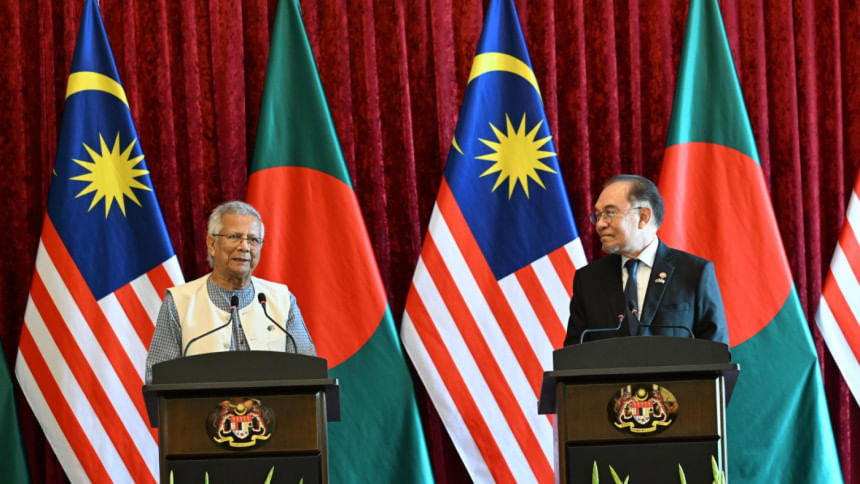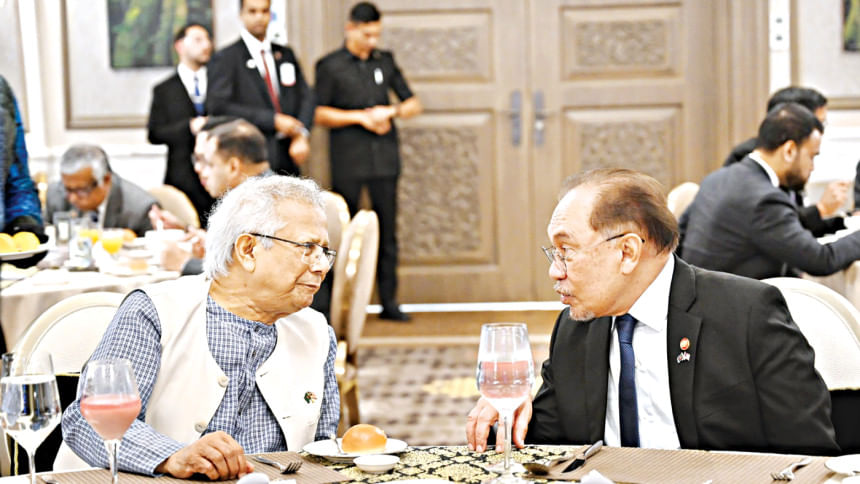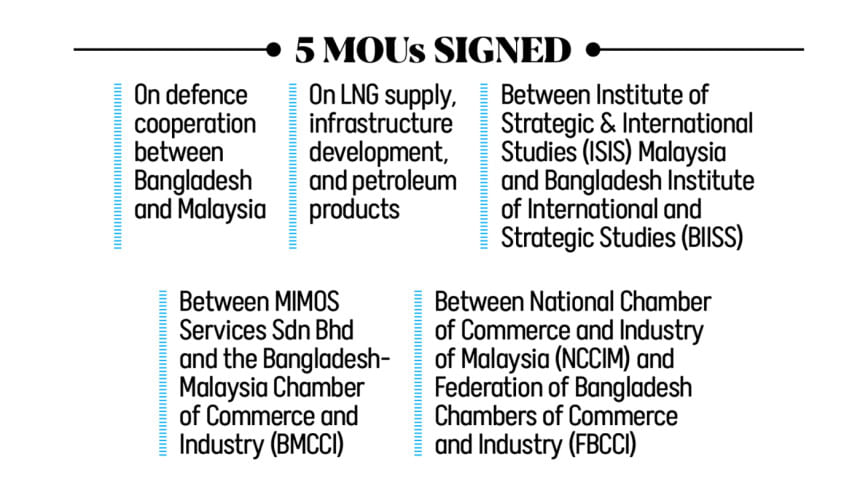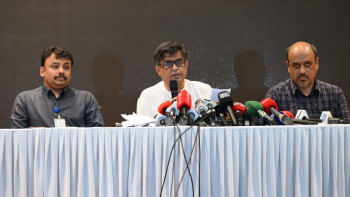Move to send peace mission to Myanmar

Malaysia and several other Southeast Asian countries will send a joint peace mission to Myanmar in the coming weeks to advocate for peace and humanitarian aid for the Rohingya population and other communities in the country.
To ensure that peace is achieved and the end to atrocities against some ethnic minorities and the people of Myanmar, Malaysian Foreign Minister Mohamad Hasan will coordinate with the team comprised of members from Indonesia, the Philippines and Thailand to visit Myanmar in the next few weeks.
"Malaysia is concerned with the burden placed on Bangladesh of having to cater to enormous numbers of Rohingya refugees," said Malaysian Prime Minister Anwar Ibrahim at a joint press conference after a bilateral meeting with Chief Adviser Prof Muhammad Yunus in Putrajaya yesterday.
"Therefore, to secure peace in Myanmar is, of course, a great priority, along with immediate humanitarian assistance for the suffering first, the refugees, and also the victims of earthquakes," he said.
A civil war has been raging in Myanmar since a military coup in 2021.


Bangladesh hosts around 1.2 million Rohingya refugees, most of whom fled a military crackdown in Myanmar's Rakhine state in 2017. Now rebel group Arakan Army controls about 90 percent of Rakhine State.
Since 2023, an additional 2,00,000 have fled to Bangladesh. No repatriation has taken place over the years despite various attempts. The Association of Southeast Asian Nations (ASEAN) could do little to address the issue.
To bring global focus back to the Rohingya crisis, the UN, at the request of Bangladesh, is going to organise a high-level conference on the Rohingya crisis on September 30 in New York.
A preparatory conference will be held in Cox's Bazar on August 25, the eighth anniversary of the Rohingya influx into Bangladesh.
Malaysia also shelters more than 1,00,000 Rohingya refugees and faces challenges in addressing Rohingya trafficking through the sea.
Anwar Ibrahim said he commends Bangladesh for taking the initiative in multilateral forums in New York, Kolkata, and Malaysia.
"I believe the close relationship between Malaysia and Bangladesh will continue to be forged with respect, trust, and a great commitment to bring about mutual progress, not only for the welfare of the people of both countries, but also for the peace, stability, and prosperity of the region," he said.
Prof Yunus is on a three-day visit to Malaysia at the invitation of Anwar Ibrahim, who was the first to visit Bangladesh after the formation of the interim government on August 8 last year.
Earlier, Prof Yunus was accorded a red-carpet welcome with a guard of honour as he arrived at the Malaysian prime minister's office.
The two leaders first held a one-on-one meeting, preceded by a restricted session with select senior officials.
Later, they led delegation-level talks covering a wide range of bilateral issues, including trade, investment, migration, energy cooperation, the blue economy, education, and cultural exchange.
STRATEGIC PARTNERSHIP
Bangladesh and Malaysia have reaffirmed their commitment to transform Bangladesh–Malaysia relations into a deeper, future-orientated strategic partnership, according to a statement from the chief adviser's office.
Bangladesh and Malaysia yesterday signed five Memoranda of Understanding (MoUs) and three Exchange of Notes in diverse areas of cooperation on defence, energy, education, investment, diplomatic training etc.
"Our two countries share a deep bond rooted in history, religion, and cultural empathy. Malaysia is a unique partner of Bangladesh, particularly in human resources, trade, and people-to-people contact," the chief adviser said at the start of the delegation-level talks.
He emphasised the need to boost trade and expand cooperation in migrant worker welfare, education, and efforts to resolve the Rohingya crisis.
The leaders discussed Bangladesh's aspiration to deepen engagement with ASEAN, including its bid for Sectoral Dialogue Partner status, and sought Malaysia's support during its ASEAN chairmanship.
Yunus invited Malaysia to participate in the upcoming Conference on the Rohingya Crisis in Cox's Bazar and the UN-led international conference on the Rohingya issue in New York in September.
On economic matters, the two sides agreed to accelerate negotiations on a Bangladesh–Malaysia Free Trade Agreement, strengthen investment cooperation through Special Economic Zones, and operationalise the Malaysia–Bangladesh Joint Business Council.
Highlighting the growing bilateral trade imbalance, Dhaka sought greater market access for Bangladeshi products such as medicines, batteries, footwear, ceramics and jute.
Bangladesh sought Malaysia's support in developing its Blue Economy and Halal industry, including establishing a Halal Economic Zone outside Dhaka, and expressed interest in joining the Regional Comprehensive Economic Partnership (RCEP).
RECRUITMENT
Prof Yunus thanked Malaysia for facilitating the entry of nearly 8,000 Bangladeshi workers, who could not enter Malaysia because it had frozen foreign labour recruitment on May 31 last year, and for introducing multiple-entry visas, allowing workers to return home during emergencies without risking their jobs.
Both sides underscored the importance of transparent and fair recruitment processes to reduce costs and safeguard worker welfare, the CA office statement said.
Currently, there are about 1.2 million Bangladeshi workers in Malaysia, but some 4,00,000 of them are undocumented, and the recruitment cost for the Bangladeshis between 2022 and 2024 ranged between Tk 4,50,000 and Tk 6,00,000, much higher than that of Tk 78,000 fixed by the two governments.
At the delegation-level talks, Expatriates' Welfare Adviser Asif Nazrul urged Malaysia to take steps to regularise the undocumented Bangladeshi workers.
He also requested recruiting more skilled and professional Bangladeshis, including doctors and engineers, noting that Bangladesh's state-run agency BOESL is capable of handling recruitment for Malaysian companies.
He also called for opportunities for Bangladeshi security guards and caregivers.
Malaysian officials confirmed that Bangladeshi workers will now be entitled to the same social security benefits as Malaysian workers and will be able to lodge complaints in Bangla.
Anwar Ibrahim said he places Bangladesh as an important partner because Bangladeshi workers have been instrumental in contributing to the development of both countries.
"You have made some proposals and were given priority, particularly to assist the stranded workers," he said, adding that Malaysia has continued to have energy cooperation with Petronas and with Axiata in the telecommunications sector.
"Now, we want to strengthen this into halal industry, STEM, research, and semiconductors."
Bangladesh also requested "Graduate Pass" visas for thousands of its students in Malaysian universities.
Currently, up to 10,000 Bangladeshi students are studying in Malaysia.

 For all latest news, follow The Daily Star's Google News channel.
For all latest news, follow The Daily Star's Google News channel. 







Comments